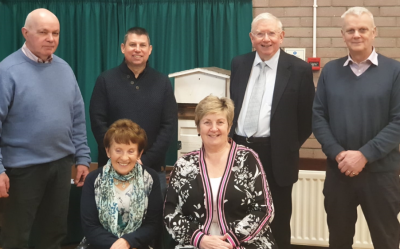 This report was sent to ECI by Alan Keys:
This report was sent to ECI by Alan Keys:
A few members of the congregation of the Cookstown and South Derry Circuit of the Methodist Church in Ireland have started this initiative. The aim is to encourage and support anyone and everyone to keep honey bees, and to plant trees.
The thinking behind this is simple:
– More bees > better pollination > more food
– More trees > less atmospheric Co2 > slower climate change
– Bees visit trees for pollen and nectar but unfortunately Ireland has been denuded of its ancient woodland and forests. Therefore more bees will need more trees.
At the first Honey Bees meeting in Cookstown, Tom Canning gave a presentation covering issues from ‘How not to get stung’, the thrill of watching foraging bees returning to your (their) hive, to ‘stealing’ some of their honey in return for sugar syrup.
The question was asked about how expensive it is to start bee keeping. Tom said it is very expensive now because it has become commercialised.
Traditionally, bee keepers would have given new bee keepers to the craft free bees, on the condition that, if the donor found him/herself without bees in the future, the recipient would return the gift.
With that in mind, the Bees and Trees Initiative could look at two ideas for bee development in Ireland.
- Where possible, bee keepers would sell a nucleus of bees to a new keeper for the cost price of a basic six-frame polystyrene hive with a free colony of bees installed inside. (Many bee keepers don’t like polystyrene hives, but they are great for small colonies because of their insulation properties and low cost).
- In keeping with the spirit of ECI, when a bee keeper is in a position to give a beginner a starter nucleus, ideally it could be given to a person of a different faith, or none. In this way, it is all constantly growing and looking outwards rather than inwards.
Tree Planting for Bees
This could happen on two fronts by twinning urban and rural congregations, where city and town congregations could plant and grow saplings and farmers and landowners from rural congregations could identify and plant up strips and scraps of less productive land with bee friendly saplings.
Quite apart from the wider environmental and societal benefits, another picture comes to mind. Your children, grandchildren, or great grandchildren, sitting underneath a majestic lime tree that you have planted, listening to the hum of the bees and smelling the intoxicating lime blossom.
Now, there’s a legacy.
Above photo: Cookstown Honey Bee Meeting: Standing: Alan Keys; Rev Rowan Zeelie, minister of Cookstown Methodist Church; Tom Canning, speaker; Robert Colvin. Seated: Ruth Thompson, Doctor Lorna Lawrence.
